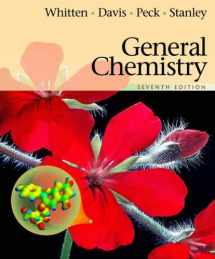
General Chemistry (Non-InfoTrac Version with CD-ROM)
ISBN-13:
9780534418519
ISBN-10:
0534418511
Edition:
7
Author:
Kenneth W. Whitten, Raymond E. Davis, Larry Peck, George G. Stanley
Publication date:
2003
Publisher:
Cengage Learning
Format:
Hardcover
1232 pages
FREE US shipping
Book details
ISBN-13:
9780534418519
ISBN-10:
0534418511
Edition:
7
Author:
Kenneth W. Whitten, Raymond E. Davis, Larry Peck, George G. Stanley
Publication date:
2003
Publisher:
Cengage Learning
Format:
Hardcover
1232 pages
Summary
General Chemistry (Non-InfoTrac Version with CD-ROM) (ISBN-13: 9780534418519 and ISBN-10: 0534418511), written by authors
Kenneth W. Whitten, Raymond E. Davis, Larry Peck, George G. Stanley, was published by Cengage Learning in 2003.
With an overall rating of 4.2 stars, it's a notable title among other
books. You can easily purchase or rent General Chemistry (Non-InfoTrac Version with CD-ROM) (Hardcover) from BooksRun,
along with many other new and used
books
and textbooks.
And, if you're looking to sell your copy, our current buyback offer is $0.53.
Description
The best-selling text, GENERAL CHEMISTRY by Whitten/Davis/Peck/Stanely is best summarized by "classic text, modern presentation." This simple phrase underlies its strong emphasis is on fundamental skills and concepts. As in previous editions, clearly explained problem-solving strategies continue to be the strength of this student-friendly text. This revision builds on the highly praised style and applications to everyday life that have earned this text a reputation as the voice of authority in general chemistry. Whitten always has been viewed as one of the few truly "traditional" General Chemistry texts. Examples of this are that the text covers Thermodynamics, normally a topic split into two parts and covered in two different semesters, in one chapter and begins the second half of the course. GENERAL CHEMISTRY, 7th also follows a standard narrative-example-problem format, has a solid traditional writing style, and promotes problem solving. However, the authors have added some new elements over the years to reflect changes in chemical education. These include adding in conceptual questions in the problem sets, adding features like the CHEMISTRY IN USE boxes to show how chemistry is used in daily life, and further promoting problem solving by including hints and checks for students.


We would LOVE it if you could help us and other readers by reviewing the book
Book review

Congratulations! We have received your book review.
{user}
{createdAt}
by {truncated_author}


